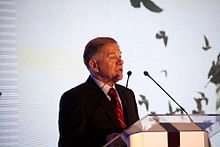Ivo Komšić
| Ivo Komšić | |
|---|---|

Honorific Citizen of Sarajevo award, 2015
|
|
| 38th Mayor of Sarajevo | |
|
Assumed office 27 March 2013 |
|
| Preceded by | Alija Behmen |
| Representative in the House of Representatives of the Federation | |
|
In office 2006–2010 |
|
| Chairman of the House of Peoples of the Federation | |
|
In office 2000–2002 |
|
| Leader of the New Croatian Initiative | |
|
In office 12 April 1993 – October 1995 |
|
| Personal details | |
| Born |
16 June 1948 Kiseljak, SR Bosnia and Herzegovina, Yugoslavia |
| Political party |
League of Communists (until 1991) Party of Democratic Reform (1991–93) NCI (1993–96) SDP (1996–2002) SDU (2002–present) |
| Education | University of Sarajevo (1977, M.Phil; 1985, Ph.D) |
| Religion | Roman Catholicism |
Ivo Komšić (born 16 June 1948) is a Bosnian doctor, professor, politician of the Social Democratic Union and the current mayor of Sarajevo, the capital of Bosnia and Herzegovina. He was a key figure in the talks that led to the end of the Bosnian war with the Dayton Accords, and the formation of the Federation during the Bosnian War. He has been described as a "moderate" politician.
Komšić was born into a Roman Catholic Bosnian Croat family in the village Borina by Kiseljak, Bosnia and Herzegovina. When he was born, in 1948, the country was part of Yugoslavia.
At the beginning of aggression on the Republic of Bosnia and Herzegovina in 1992, Komšić served temporarily as the Ministry of Defense as a volunteer and joined a humanitarian organization in Kiseljak.
Komšić joined the Party of Democratic Reform political party in March 1991, leaving it after co-founding the New Croatian Initiative on 12 April 1993 with a group of Croat intellectuals, shortly before the escalation of war in Central Bosnia. This party created an alternative Croat policy in Bosnia and Herzegovina, opting for preservation of unified Republic of Bosnia and Herzegovina and coexistence of Croats with other nations in the whole of Bosnia and Herzegovina. In November 1993 he became a member of Republic of Bosnia and Herzegovina Presidency based on the result of 1990 elections.
He was a key figure in the formation of the Federation during the Bosnian War and the talks that led to the end of the Bosnian war with the Dayton Accords.
...
Wikipedia
